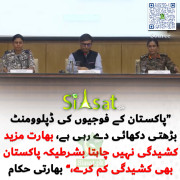alimohsan52
Chief Minister (5k+ posts)
Source: http://app.com.pk/en_/index.php?option=com_content&task=view&id=228609&Itemid=1

ISLAMABAD, March 14 (APP): U.S. Ambassador Richard Olson and Governor of Khyber Pakhtunkhwa Shaukat Ullah Khan, Thursday joined business owners to celebrate the dramatic economic recovery of Swat Valley. The positive comeback was made possible through a strong partnership between the U.S. Agency for International Development (USAID), the Khyber Pakhtunkhwa (KP) provincial government, the KP Tourism Corporation, and business owners in the region.
The hotels and fisheries previously damaged by conflicts and floods have increased their sales revenues from $454,000 in 2010 to $4.2 million in 2012, and generated over 2,000 new jobs.
Ambassador Olson said in the wake of the conflict and floods that have devastated the area over the past five years, in 2010, the U.S. government and the government of Pakistan jointly decided that the recovery of the Swat Valley’s economy should be a priority.
“These efforts to revive Swat’s tourism industry have helped create jobs and enhance incomes for the people of Swat Valley,” Ambassador Olson said.
Historically, tourism has been a key economic driver in the Swat Valley and at one time contributed $60 million a year to the local economy. However conflict and the 2010 floods severely damaged hotels and caused a significant decline in revenues. Fisheries faced similar losses.
To help jump-start the economic revival of the region, in 2010, USAID joined the Provincial Reconstruction, Rehabilitation and Settlement Authority to launch a Swat tourism rehabilitation effort, and the United States provided $5.4 million to fund this initiative.
USAID provided grants, technical assistance, and in-kind support, such as construction materials, supplies, and equipment to 22 fisheries and 239 hotels - more than half of all hotels in the Swat Valley.
Backed by this support, the businesses achieved great success. The hotels now earn eight times more revenue than they did before the project began. The fisheries earn twelve times more revenue than before U.S. assistance began.
USAID estimates that the Swat Valley tourism industry will continue to grow in 2013, reaching $5 million in revenue.

ISLAMABAD, March 14 (APP): U.S. Ambassador Richard Olson and Governor of Khyber Pakhtunkhwa Shaukat Ullah Khan, Thursday joined business owners to celebrate the dramatic economic recovery of Swat Valley. The positive comeback was made possible through a strong partnership between the U.S. Agency for International Development (USAID), the Khyber Pakhtunkhwa (KP) provincial government, the KP Tourism Corporation, and business owners in the region.
The hotels and fisheries previously damaged by conflicts and floods have increased their sales revenues from $454,000 in 2010 to $4.2 million in 2012, and generated over 2,000 new jobs.
Ambassador Olson said in the wake of the conflict and floods that have devastated the area over the past five years, in 2010, the U.S. government and the government of Pakistan jointly decided that the recovery of the Swat Valley’s economy should be a priority.
“These efforts to revive Swat’s tourism industry have helped create jobs and enhance incomes for the people of Swat Valley,” Ambassador Olson said.
Historically, tourism has been a key economic driver in the Swat Valley and at one time contributed $60 million a year to the local economy. However conflict and the 2010 floods severely damaged hotels and caused a significant decline in revenues. Fisheries faced similar losses.
To help jump-start the economic revival of the region, in 2010, USAID joined the Provincial Reconstruction, Rehabilitation and Settlement Authority to launch a Swat tourism rehabilitation effort, and the United States provided $5.4 million to fund this initiative.
USAID provided grants, technical assistance, and in-kind support, such as construction materials, supplies, and equipment to 22 fisheries and 239 hotels - more than half of all hotels in the Swat Valley.
Backed by this support, the businesses achieved great success. The hotels now earn eight times more revenue than they did before the project began. The fisheries earn twelve times more revenue than before U.S. assistance began.
USAID estimates that the Swat Valley tourism industry will continue to grow in 2013, reaching $5 million in revenue.



































